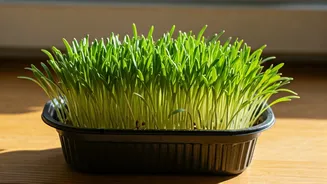Start with Ease
Embarking on a home gardening journey doesn't have to be intimidating or expensive. You can begin with small, manageable steps. Consider starting with a few
herbs or leafy greens, which are relatively easy to cultivate, even in limited spaces. Utilizing recycled containers, like old plastic pots or repurposed tubs, can greatly reduce your initial costs. The key is to start small, observe your plants, and learn from each experience. Choosing a sunny location and ensuring your plants have well-draining soil are essential. Regular watering, combined with simple composting techniques to enrich the soil, will set the foundation for a flourishing garden. As you gain experience, you can gradually expand your garden, adding more variety and complexity to your home-grown produce.
Cost-Effective Gardening
Keeping costs low is a significant advantage of home gardening, allowing you to enjoy fresh produce without breaking the bank. There are several ways to minimize expenses. Propagating plants from seeds is far more economical than buying established plants from a nursery. Collect seeds from your existing plants or purchase affordable seed packets online or from local stores. Another excellent strategy is composting kitchen scraps and yard waste. This reduces waste and provides nutrient-rich fertilizer for your plants. Companion planting, where you grow different plants together to deter pests and improve growth, can decrease the need for expensive pesticides. Furthermore, consider rainwater harvesting to reduce water bills and provide your plants with naturally beneficial water. These cost-saving methods make home gardening accessible and sustainable, allowing you to enjoy the benefits without high costs.
Versatile Meal Additions
Home-grown produce enhances your meals in multiple ways, adding both flavor and nutritional value. Cultivating a variety of vegetables and herbs allows you to experiment with diverse cuisines and tailor your dishes to your preferences. Imagine having fresh basil to add to your pasta, mint for refreshing beverages, or colorful bell peppers to liven up your salads. Growing your ingredients ensures you have access to produce at its peak freshness, intensifying the taste and nutritional content of your meals. Additionally, home gardening encourages experimentation, letting you explore new recipes and cooking techniques. Using seasonal produce offers a connection to the natural cycle, inspiring you to create exciting new dishes based on what's available in your garden. The versatility of fresh, home-grown ingredients truly transforms the dining experience.
Sunflower Seed Cultivation
Sunflower seeds provide a unique opportunity to boost your health and diversify your home garden. Sunflowers are relatively easy to grow, thriving in sunny locations and well-draining soil. These majestic plants not only add beauty to your garden but also provide edible seeds packed with nutrients. Planting sunflower seeds is a straightforward process; simply sow them directly into the ground after the last frost. Ensure they have sufficient sunlight and adequate watering. Harvest the seeds when the sunflower heads droop and the backs turn yellow-brown. Once harvested, you can roast the seeds for a crunchy snack, add them to salads, or use them as an ingredient in various recipes. Sunflowers are also beneficial to the environment, attracting pollinators and adding biodiversity to your garden. Cultivating sunflower seeds is a simple yet rewarding way to integrate healthy habits into your lifestyle.
Nutrient-Rich Sprouts
Incorporating nutrient-rich sprouts into your diet is a straightforward way to increase your intake of vitamins, minerals, and antioxidants. Sprouting is the process of germinating seeds and legumes, typically within a few days, providing a concentrated source of essential nutrients. Various seeds, such as alfalfa, mung beans, and lentils, can be sprouted easily at home using a jar or specialized sprouting equipment. The process involves soaking the seeds, rinsing them regularly, and allowing them to germinate in a cool, dark place. Sprouts are versatile ingredients that can be added to salads, sandwiches, smoothies, or used as a garnish. They offer a unique texture and flavor, boosting your meals' nutritional value and adding a fresh element to your dishes. Regular consumption of sprouts can contribute to overall health and well-being, making them a valuable addition to your dietary choices.















